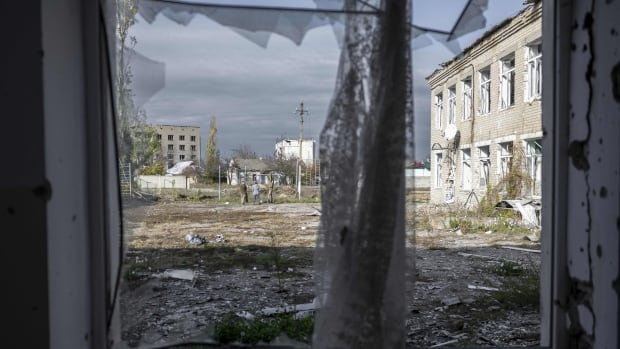
The UN’s nuclear agency says its inspections in Ukraine found no evidence of radioactive “dirty bomb” activity alleged by Russia.
The International Atomic Energy Agency said Thursday that the inspections requested by the Ukrainian government “did not find any indications of undeclared nuclear activities and materials.”
The agency said its experts carried out inspections in three locations in Ukraine and were given unfettered access to the sites.
“Based on the evaluation of the results available to date and the information provided by Ukraine, the agency did not find any indications of undeclared nuclear activities and materials at the locations,” it said in a statement.
Top Russian officials, including President Vladimir Putin, have made repeated unfounded claims that Ukraine planned to detonate a bomb that scatters radioactive waste in a false flag operation it would try to pin on Moscow.
IAEA inspectors have completed in-field verification activities at three locations in <a href=”https://twitter.com/hashtag/Ukraine?src=hash&ref_src=twsrc%5Etfw”>#Ukraine</a> at the request of the 🇺🇦 government — found no indications of undeclared nuclear activities and materials. <a href=”https://t.co/RiY9hdJjSb”>https://t.co/RiY9hdJjSb</a> <a href=”https://t.co/muPb3jeDOU”>pic.twitter.com/muPb3jeDOU</a>
—@iaeaorg
Russia’s UN ambassador, Vassily Nebenzia, claimed in a letter to the Security Council members last week that Ukraine’s nuclear research facility and mining company “received direct orders from [President Volodymyr] Zelenskyy’s regime to develop such a dirty bomb.”
Western nations have called Moscow’s repeated claim “transparently false.” Ukrainian authorities dismissed it as an attempt to distract attention from alleged Russian plans to detonate a “dirty bomb” as a way to justify an escalation of hostilities.
Shelling again disconnects nuclear plant
Meanwhile, Ukraine’s nuclear operator said Thursday that Russian shelling damaged power lines connecting Europe’s largest nuclear power plant to the Ukrainian grid, leaving the plant again relying on emergency diesel generators.
As fighting in Ukraine has damaged power lines and electrical substations, the Zaporizhzhia nuclear power plant has repeatedly operated on backup generators to cool its reactors and keep other safety systems running until regular power could be restored. The generators have enough fuel to maintain the plant in southeastern Ukraine for just 15 days, state nuclear power company Energoatom said on its Telegram channel.
The Current10:30A Fifth Estate investigation into alleged Russian war crimes in Ukraine
Alex Shprintsen tells us about an investigation from CBC’s The Fifth Estate, which looked into alleged war crimes in Andriivka, a suburb of Ukraine — and connected them to the confession of a Russian soldier.
“The countdown has begun,” Energoatom said, noting it had limited possibilities to “maintain the ZNPP in a safe mode,” raising fears of a potential nuclear disaster.
The IAEA said Thursday that the plant’s latest switch to backup power further underlines “the extremely precarious nuclear safety and security situation at the facility and the urgent need to establish a protection zone around it.”
The development “again demonstrates the plant’s fragile and vulnerable situation,” said Rafael Grossi, IAEA’s director general.
Relying on diesel generators “is clearly not a sustainable way to operate a major nuclear facility,” Grossi went on. “Measures are needed to prevent a nuclear accident at the site. The establishment of a nuclear safety and security protection zone is urgently needed.”
The plant’s six reactors are not in operation, but outside electricity is needed to cool its spent fuel. Russia and Ukraine have traded blame for months amid the war for shelling at and around the plant that the IAEA has warned could cause a radiation emergency.
Russian forces occupied the plant during the early days of the war. The plant is located in the Zaporizhzhia region, part of which has been occupied by Russian forces and illegally annexed, along with three other provinces, by Putin last month.
Although Putin signed a decree transferring the nuclear plant to Russian ownership, Ukrainian workers continue to run the plant.
At least 6 killed, prisoner swaps continue
Across the Dnipro River from the power plant, the city of Nikopol was also shelled again, damaging residential buildings, a gas station and several private enterprises, Zelenskyy’s office said Thursday.
Other Ukrainian cities were also hit, with Russia using drones, missiles and heavy artillery that left six civilians dead and 16 others wounded, according to the president’s office. Energy and water facilities were struck in Zelenskyy’s native city of Kryvyi Rih, leaving several districts without electricity or water.
Further east in the Donetsk region, battles continued for the towns of Bakhmut and Avdiivka, where authorities said the population was under constant shelling and living without electricity or heat. Over the past day, six cities and villages in the region came under attack from heavy artillery, while in the northeast, three missiles hit Ukraine’s second-largest city, Kharkiv, officials said.
Kremlin-backed authorities in the Donetsk region and Zelenskyy’s office announced another prisoner exchange Thursday, this involving 107 military personnel on each side.